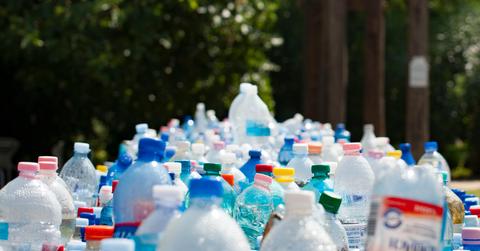This Firm From Israel Is Finding A Way For Landfill Waste To Actually Be Useful
The dream of turning waste into usable plastic isn't just a dream any longer, or so one Israeli company with a very secret conversion process has claimed.
Updated May 22 2019, 10:33 a.m. ET
Reducing waste in landfills has become a priority amongst environmental and sustainability researchers; companies are pushing for innovations in their production lines that promote recycling, and there have been pushes to promote composting as a means of reducing runoff and organic matter in the waste system. Now, and Israeli company is suggesting we deal with waste by turning it into something useful.
UBQ is an Israeli company that has just patented a process that they say turns regular landfill waste into usable plastic, reports The Daily Herald. The process has supposedly been under development for about five years, but UBQ stills needs to prove that it not only works, but could be viable on a large scale. They're opening a pilot program now in Israel's Negev Desert.
Albert Douer, UBQ's executive chairman, says the material has a number of potential uses. It could be used as a substitute for conventional plastics produced with petroleum, and even wood, which would not only clear space in landfills but reduce the consumption of oil and the harmful effects of deforestation.
"We take something that is not only not useful, but that creates a lot of damage to our planet, and we're able to turn it into the things we use every day," said Douer. Douer also works for Ajover Darnel Group, an international plastics conglomerate, and has some investment in the success of UBQ's experiments. He has invested money into the pilot program, along with a number of other private investors, giving them $30 million to work on the project.
The plant in Negev is fairly small. It can only process about one ton of waste an hour, which isn't fast enough to serve a city. However, the plant has a modular design, so the company believes it can be easily grown to fit the needs of its location. UBQ Chief Executive Tato Bigio explained to reporters that the plant sorts through the waste, and removes glass, metals, minerals—anything that can be recycled.
The remains, which include such pleasant items as "banana peels, the chicken bones and the hamburger, the dirty plastics, the dirty cartons, the dirty papers" are dried out and then sent through a mill that grinds them into powder.
This powder is broken down inside a reaction chamber. The chamber creates a composite material, a bio-based plastic. UBQ is keeping their process under pretty heavy wraps, but they claim it uses very little water and creates no greenhouse gas emissions or residual waste byproducts.
The company's chief sustainability officer, Christopher Sveen, says one of the biggest challenges facing the project is people's skepticism that the process works as UBQ claims. Converting waste into plastic is like the alchemist's dream of waste management. People have been trying to do it for years, to minimal success.
"We understand that's people's perceptions. We hope to convince them in a professional and scientific manner," Sveen said.
If UBG is successful, that is an awesome innovation in the reduction of waste, but it must be said that the best way to reduce waste is to produce less of it. The U.N. Environment Program wrote in a report from that waste reduction should be the primary focus when it comes to sustainability.
"Every year, an estimated 11.2 billion tons of solid waste are collected worldwide," they stated. "The solution, in the first place, is the minimization of waste. Where waste cannot be avoided, recovery of materials and energy from waste as well as remanufacturing and recycling waste into usable products should be the second option."
Still, if someone can come up with a real way to support that second option, it'll make a huge difference.
